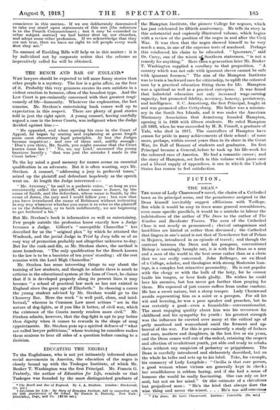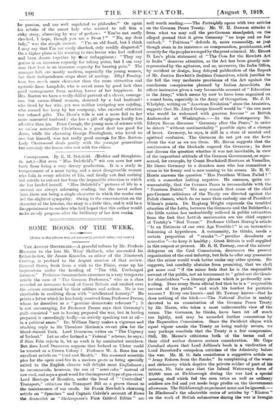FICTION.
THE DEAN.*
THE name of Lady Charnwood's novel, the choice of a Cathedral town as its principal scene, and the prominence assigned to the Dean himself inevitably suggest affiliations with Trollop°. But while it would be easy to trace some general resemblances, "even some specific parallels, it would be a mistake to labour the indebtedness of the author of The Dean to the author of The Warden and Barchester Towers. The aura of the Cathedral Close is not nearly so pronounced ; clerical antagonisms and hostilities are hinted at rather than discussed ; the Cathedral that lingers in one's mind is not that of Newchester but of Pahna in Majorca, introduced in an episode of travel ; and though the contrast between the Dean and his pompous, conventional Bishop is amusingly brought out, it is with the Dean as a man and a man of the world in the best sense rather than as a cleric that we are really concerned. John Bellenger, an ex-Head of a College, scholar, and theologian with strong Modernist leanings, is a complex but attractive personality. He is not popular with the clergy or with the bulk of the laity, for he cannot bridle his tongue, or bear fools gladly. He wishes he could love his enemies, but has never got further than praying for them. His espousal of just causes suffers from undue candour. He has a sweet nature, but a sharp temper. Lady Chama-ood avoids representing him as a saint or a paragon. For all his wit and learning,, he was a poor speaker and preacher, but he was certainly a good—even a formidable—conversationalist. The most engaging quality about him was his reverence for childhood and his sympathy for youth : his greatest strength was the influence he exerted over many at the critical age of early manhood and womanhood amid the ferment and upheaval of the war. For this is pre-eminently a study of fathers and sons, mothers and daughters, in the last five or six years, and the Dean comes well out of the ordeal, retaining the respect and affection of recalcitrant youth, yet able and ready to rebuke them without any suspicion of pedantry or priggishness. The Dean is carefully introduced and elaborately described, but on the whole he talks and acts up to his label. Take, for example, his summary of Lady Langdale : "Cecilia is that rare person, a good woman whose virtues are generally kept in check ; her unselfishness is seldom boring, and if she had a sense of humour she would be really fascinating. One can rely on her soul, but not on her mind." Or this estimate of a chivalrous but prejudiced man : "He's the kind that always does the wise thing and never the wisest. . . . He's too self-conrcious ° 2'he Dean. By Lady Charnnood. London: Constable. Os. nt.t.a for passion, and too well regulated to philander." Or again Ins rebuke of the smart lady who wanted to tell him a risky story, observing by way of preface : "You're not easily shocked, I hope,. though you are a Dean ? " "No, my dear Lady," was the simple answer. "Fm an old fossil, but 1 think I may say that I'm not easily shocked, only readily disgusted." On a higher plane is his warning to two lovers who had suffered and been drawn together by 'heir unhappiness : "They say genius is an immense capacity for taking pains, but I am very sure that love is an immense capacity for bearing pain." The younger folk are mostly modern, especially the young women, but their independence stops short of mutiny. Sibyl Fo.ssingham has much more character than the more attractive and egotistic Anne Langdale, who is saved more by good luck than good management from making havoc of her happiness. In Mrs. Barton we have a really skilful portrait of a clever, courageous, but coarse-fibred woman, deserted by a bad husband ; who lived by her wits, yet was neither intriguing nor cajoling, who earned her keep by her company, who exacted attention but refused gifts. The Dean's wife is not a niece foil to her more mercurial husband : she has a gift of epigram hardly less effective than his. Peter Creagh, the young man of science with an anima naturaliter Christiana, is a great deal too good for Anne, while the charming George Fossingham, who loved no one but himself, was not really good enough for Mrs. Barton. Lady Charnwood deals gently with the younger generation, but certainly the beaux roles rest with the elders.



































 Previous page
Previous page